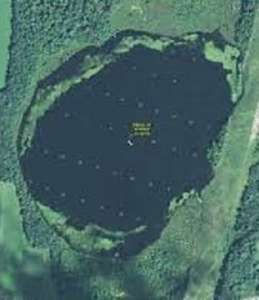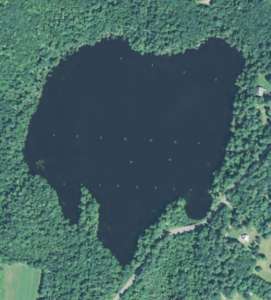Up and down the Kennebec Valley: People for whom ponds are named, Part 3
by Mary Grow
A small pond shared between Albion and its southern neighbor, China, has been known as Dutton Pond for as long as your writer has lived in China. But the map of China in the 1856 and 1879 atlases of Kennebec County names it Pickerel Pond.
Pickerel/Dutton Pond is on the north side of Dutton Road. Dutton Road branches off from Pleasant View Ridge Road, which goes east from Route 202 at the four corners southeast of China Village, on the northeast corner of China Lake’s east basin. At the top of a hill, Pleasant View Ridge Road turns sharp right (south); Dutton Road plunges down the other side of the hill, still heading east, passes the south end of Dutton Pond and crosses into southern Albion, where it becomes Libby Hill Road.
On the 1856 and 1879 maps, C. E. Dutton owned the house on the north side of the corner where Dutton and Pleasant View Ridge roads diverge. Diagonally across Dutton Road, in the southeast corner of the T intersection, was a schoolhouse.
Charles E. Dutton was neither an early settler in China nor a native of the town; he probably arrived in 1851 as a teenager (see below).
According to the Find a Grave website, Dutton was born Dec. 8, 1839. Henry Kingsbury, in his Kennebec County history, wrote that Charles was the son of Coffran Dutton and grandson of Jonathan Dutton, “who moved from Montville to Vassalboro, and in 1839 lived where Melvin Applegate now resides.” If Jonathan brought his family, Charles was born in Vassalboro.
Kingsbury continued, “In 1851 they [three generations again?] moved to China.” He next wrote that Charles Dutton married Annis W. Barlow, who was born in Freedom, Maine, Sept. 6, 1846 (or 1847, according to an on-line genealogy).
The China bicentennial history portrays Dutton as an educator first and foremost. Kingsbury listed him as a China selectman, elected in 1873 and serving seven terms, four of them as board chairman.
School District 7, in northern China, was named the Dutton district. The 1856 and 1879 maps each show a schoolhouse (the history says there were three consecutively), and apparently another was built for the 1886 school year. The Dutton district school was closed in 1902.
Each China school district had a school agent, usually elected by town meeting voters, whose responsibilities included allocating funds and recommending how many school terms to have for how long each year and what teacher(s) to hire. School agents were responsible to the town’s school committee (until 1857 and from 1863 to 1870) or to the school supervisor.
(China had a maximum of 22 school districts, rearranged repeatedly. School was usually held two terms a year, a shorter one [between a month and three months] in summer and a longer [two to four months] winter term. Dates were not standardized; and a district might skip or shorten a term, especially if money were tight.)
The China history includes Charles Dutton on a list of people who taught many terms, “usually with favorable comments.” Kingsbury wrote that he taught 27 terms, “nearly all in the town of China.” One term mentioned in the history was in the winter of 1872-1873: Dutton taught algebra in the China Village school, close to his home.
Dutton must have been China’s supervisor of schools in 1878, because he reported in 1879 that there were too many different textbooks in use – 20 geography texts, for example, some “so old that they listed only the first thirty-three states in the United States.” (The 34th state, Kansas, was admitted Jan. 29, 1861; it was followed by West Virginia in 1863, Nevada in 1864, Nebraska in 1867 and Colorado in 1876, for a total of 38 states by the end of 1878.)
At the March 1879 town meeting, voters accepted Dutton’s recommendation to appoint a five-man committee to look into consolidating school districts and standardizing textbooks. He and four other distinguished residents reported to a special meeting held May 5, 1879.
The history says nothing about districts, but it says voters approved the committee’s recommended textbooks and voted “to sustain” Dutton as he introduced them and disallowed all others. Dutton bought the books and, the history says, donated his commission to the students, who had to buy them in turn.
(Alas, by 1886 a new supervisor was again deploring the variety of texts; he recommended the town start buying and owning books for students. In August 1890, a state law “requiring towns to provide free textbooks” became effective. China spent $862 for textbooks in 1891and by the beginning of 1893 owned 1,730.)
In 1879-1880, Dutton was again supervisor of schools. The history related his dealings with a Colby College student whom he hired without examination, assuming him qualified, for another northern China district.
There were soon complaints that the young man “could not do arithmetic and was generally incompetent.” Dutton found the complaints valid and fired the teacher; district parents “relented and petitioned that he be reinstated.”
He came back, “but remained incompetent, and Mr. Dutton felt that the students’ time had been wasted.”
In the fall of 1879, supervisor Dutton visited the District 16 school in western China, where he found three students. The China history says he “promptly went to see some of the district parents, who told him they simply were not ready to have their children gone for five or six hours a day.” (Whether the children were too young, or were old enough so they were needed to help with fall work, the history does not say.)
Dutton unsympathetically ordered the school to stay open. The parents’ money therefore continued to be spent; and, the history says, “the students soon appeared.”
Dutton was a Mason. Kingsbury listed him as master of Central Lodge in China Village in 1864 and 1869, and of the village’s second Masonic organization, Dunlap Chapter, in 1875 and 1886.
He was active in the China Cemetery Association, organized in 1865 to manage the large China Village cemetery at the head of the lake (and since the 1940s the extension cemetery on Neck Road). The bicentennial history says he was president of the organization in the 19th century (citing Kingsbury, so before 1892) and from 1911 to 1921.
A list of members of Maine’s 17th legislature, in 1911, includes Charles E. Dutton from China.
Charles and Annis Dutton had four children. Find a Grave lists a daughter, Idella, born in 1869; twins, Arthur J. and Fannie A., born July 18, 1874; and a younger son, Everett E., born Jan. 26, 1887. All lived past 1950.
Idella married Fred H. Lewis (1860-1933), of China, and is buried with him in the China Village cemetery.
Charles Dutton died in China Sept. 5, 1922; Annis died in China April 5, 1926. Both are buried in the China Village cemetery; the same gravestone names them and their other three children.
Dutton Pond, shared between China and Albion, has an area of 57 acres and a maximum depth of 33 feet, according to the Maine Department of Inland Fisheries and Wildlife and to Lake Stewards of Maine.
* * * * * *
China’s Evans Pond is south of Dutton Pond and entirely within the town. It lies on the east side of Hanson Road; Hanson Road runs roughly north-south east of China Lake, approximately half-way between Lakeview Drive along the lake and Pleasant View Ridge Road farther east.
The pond was named for an early settler – before the Revolution, Kingsbury wrote, and “contemporary with the pioneers” (the Clark brothers, who came in 1774) – named Joseph Evans.
An on-line source calls him Joseph Evans, Sr., born Nov. 23, 1740, in Dorchester, Massachusetts, to Richard and Zipporah (Blake) Evans. On April 28, 1766, he married Ame (also Ama, Amey, Ann or Anna) Payson, in Sharon, Massachusetts. She was born before July 22, 1750.
This source says Joseph “registered for military service” in 1777, but does not say from where – if Kingsbury is correct, from what is now China (which was Jones Plantation until 1796 and Harlem until 1818).
Kingsbury said he left his wife and children in the wilderness by Evans Pond while he served in the Revolution. (The first four of the Evans’ four sons and three daughters were born before 1775, this source says; another on-line site lists only one son.)
The seven-child on-line source says the Evans’ youngest daughter, Zipporah, was born in Vassalboro in 1781; married in China in 1802; and died in Houlton in 1854. Their youngest son, Nathaniel, Jr., was born in 1788 in China and died there in 1861.
This source puts Evans in Lincoln, Maine, in 1790. If so, he was back in China by 1797; the bicentennial history names Joseph and Nathaniel Evans among founding members of the First Baptist Church of Harlem, organized that year.
Nathaniel Evans could have been Joseph’s younger brother, born in Dorchester April 5, 1745; married in Vassalboro in November 1772; “registered for military service in 1777 [with his brother?]”; and died June 14, 1819, in Searsmont.
The China history says Joseph Evans was in Harlem in 1801 and 1802, and in 1801 a comparatively well-off resident: town meeting voters entrusted a pauper named Jack to his care. Evans was to receive “thirty dollars and the use of a cow” in return, prorated if Jack stayed less than a year with him.
In 1802, town meeting voters were asked to accept as a town road “the road between Joseph Evans’ dwelling and the lake [China Lake, presumably].”
The on-line source says Joseph died in mid-April 1826 and Ame sometime after 1830, both in China.
Kingsbury gave a paragraph to one of Joseph and Ame’s grandsons, Cyrenus Kelley Evans (May 13, 1816-Dec. 4, 1891). Find a Grave’s website has a photo of his gravestone in the South China Village cemetery that says his name was Cyrenius.
This Evans married Ephraim Clark’s granddaughter Asenath Clark (May 24, 1820-Oct. 9, 1911), thereby uniting two of China’s early families.
Kingsbury wrote that Evans “filled important positions in China and was twenty-one years justice of the peace.” The Find a Grave website says, “Mr. Evans filled important positions in China, and was twenty-one years of age when justice of the peace.”
A June 1870 on-line list of Maine magistrates says Evans was appointed a justice of the peace March 4, 1868, but does not specify whether that was his first appointment.
Evans Pond has an area of 19 acres and a maximum depth of only 14 feet, according to the Department of Inland Fisheries and Wildlife (as of 2000). Lake Stewards of Maine gives the size as 29 acres and agrees on the depth.
Main sources
Grow, Mary M., China Maine Bicentennial History including 1984 revisions (1984)
Kingsbury, Henry D., ed., Illustrated History of Kennebec County Maine 1625-1892 (1892)
Websites, miscellaneous.
Responsible journalism is hard work!
It is also expensive!
If you enjoy reading The Town Line and the good news we bring you each week, would you consider a donation to help us continue the work we’re doing?
The Town Line is a 501(c)(3) nonprofit private foundation, and all donations are tax deductible under the Internal Revenue Service code.
To help, please visit our online donation page or mail a check payable to The Town Line, PO Box 89, South China, ME 04358. Your contribution is appreciated!







Leave a Reply
Want to join the discussion?Feel free to contribute!